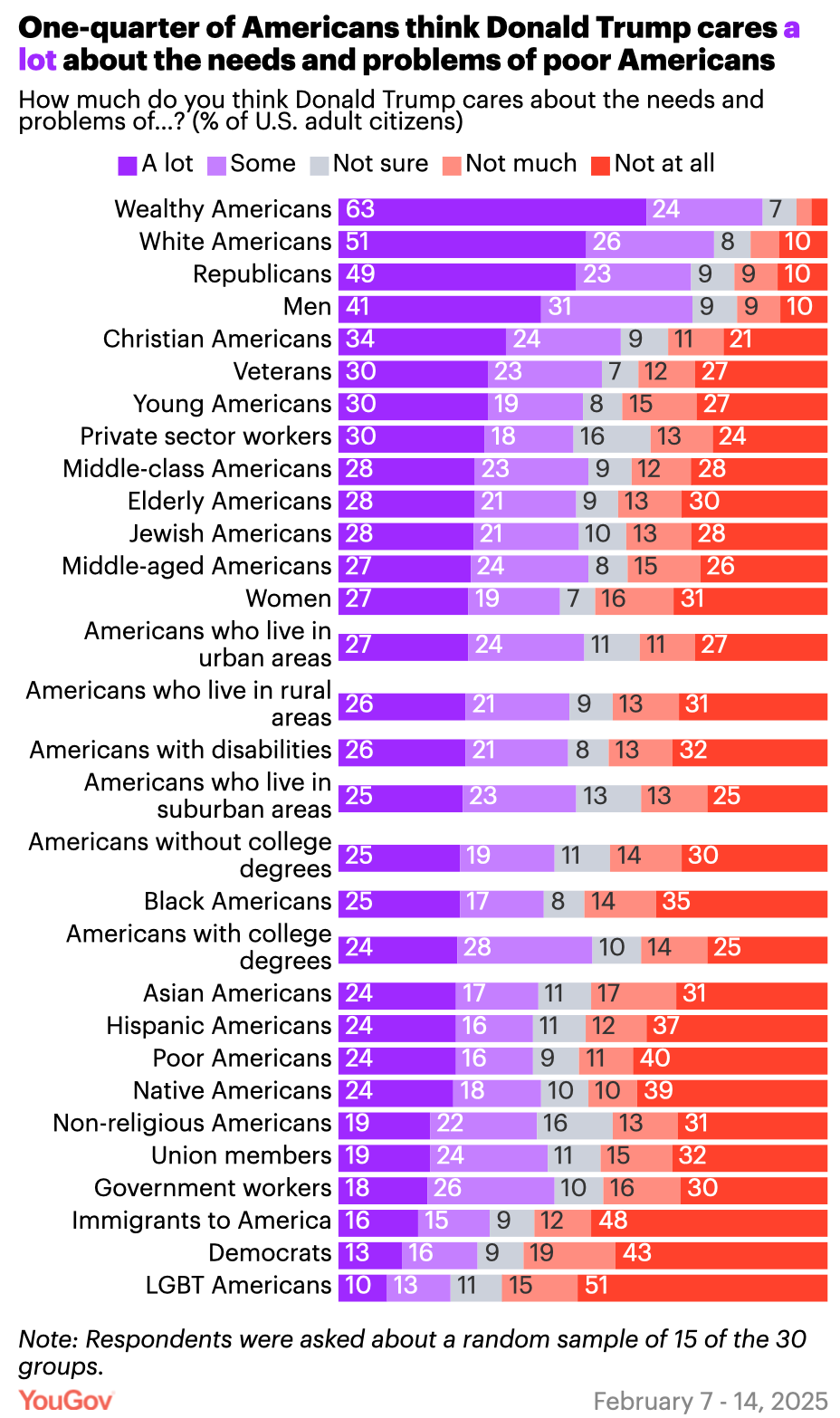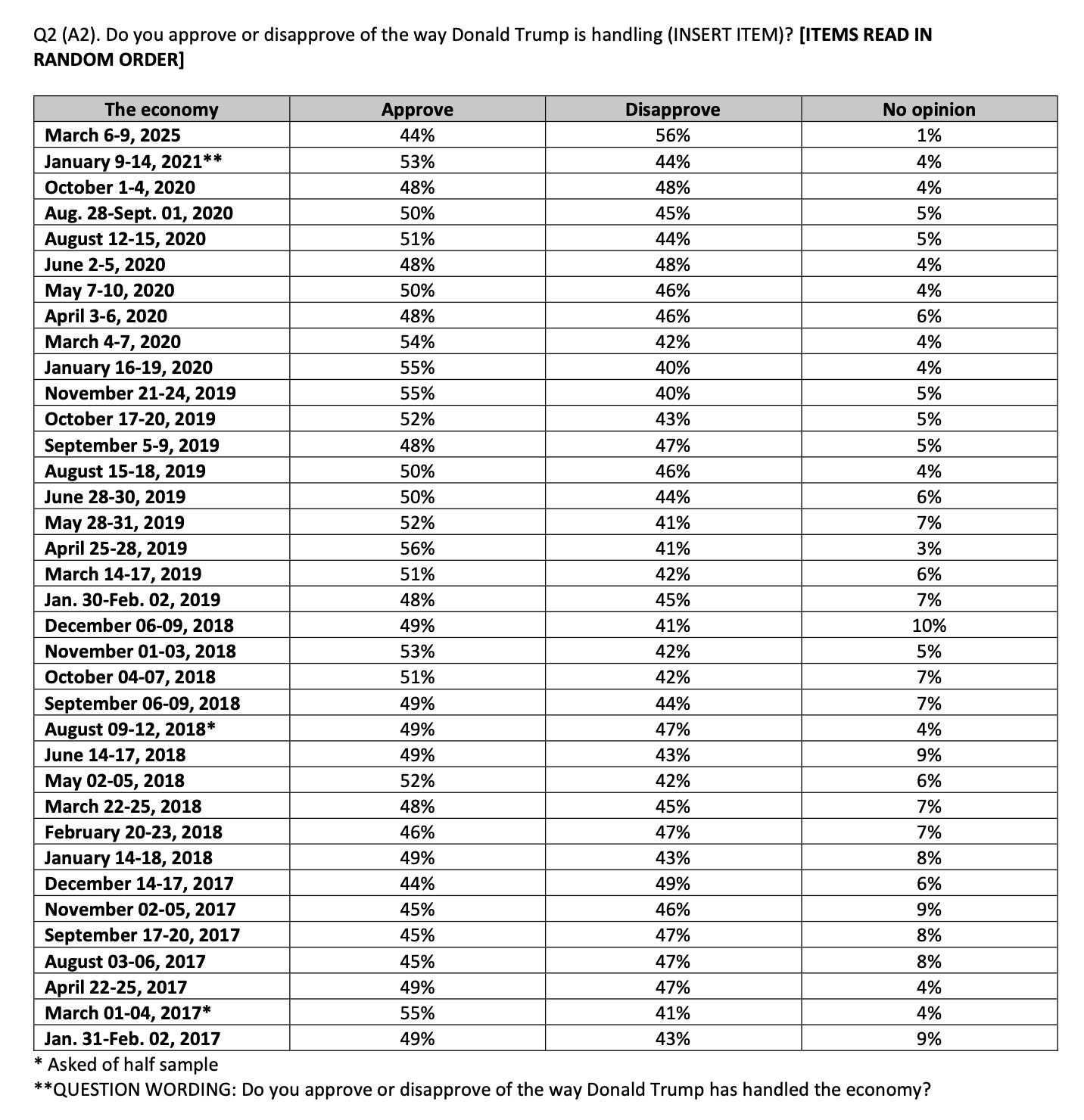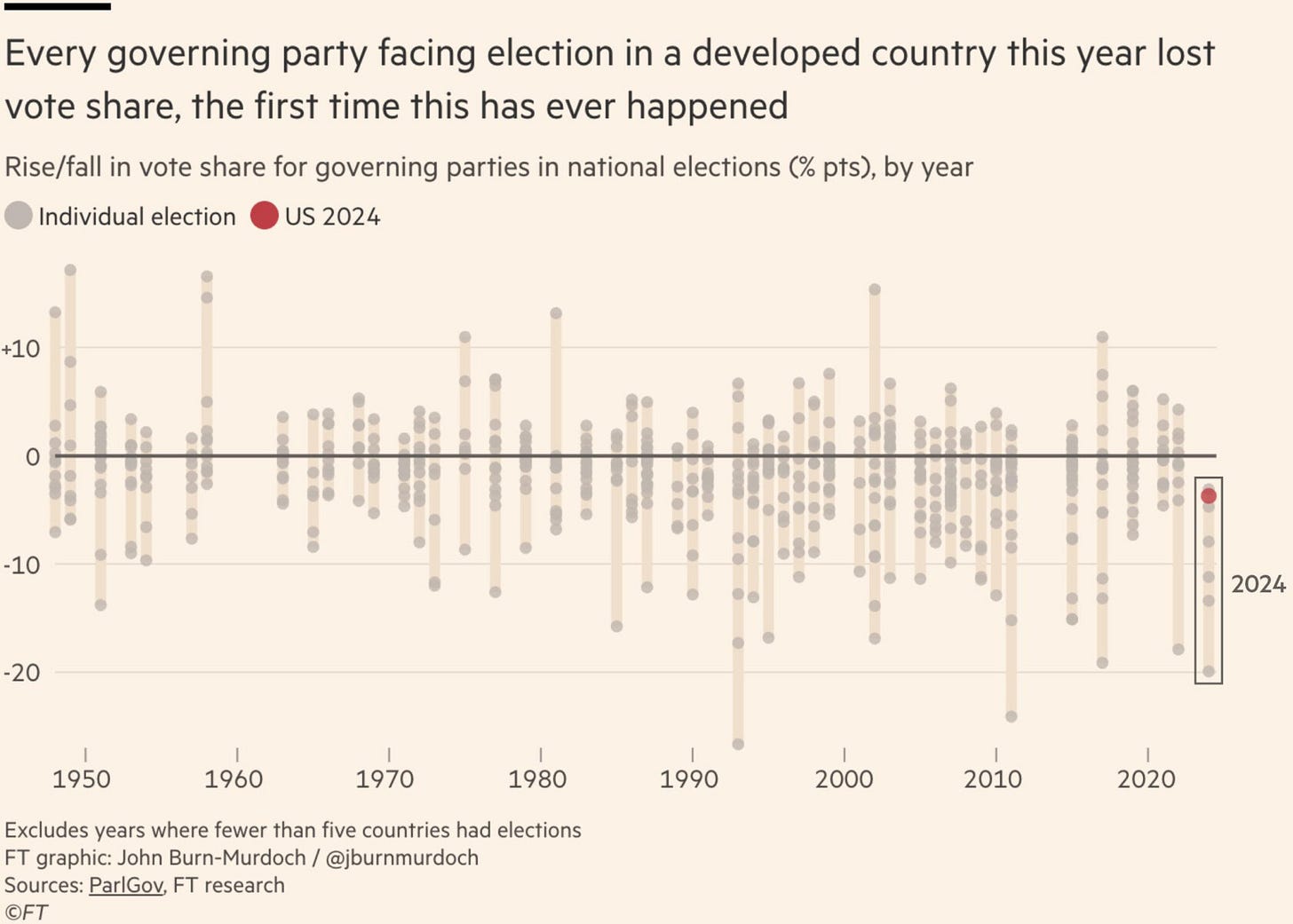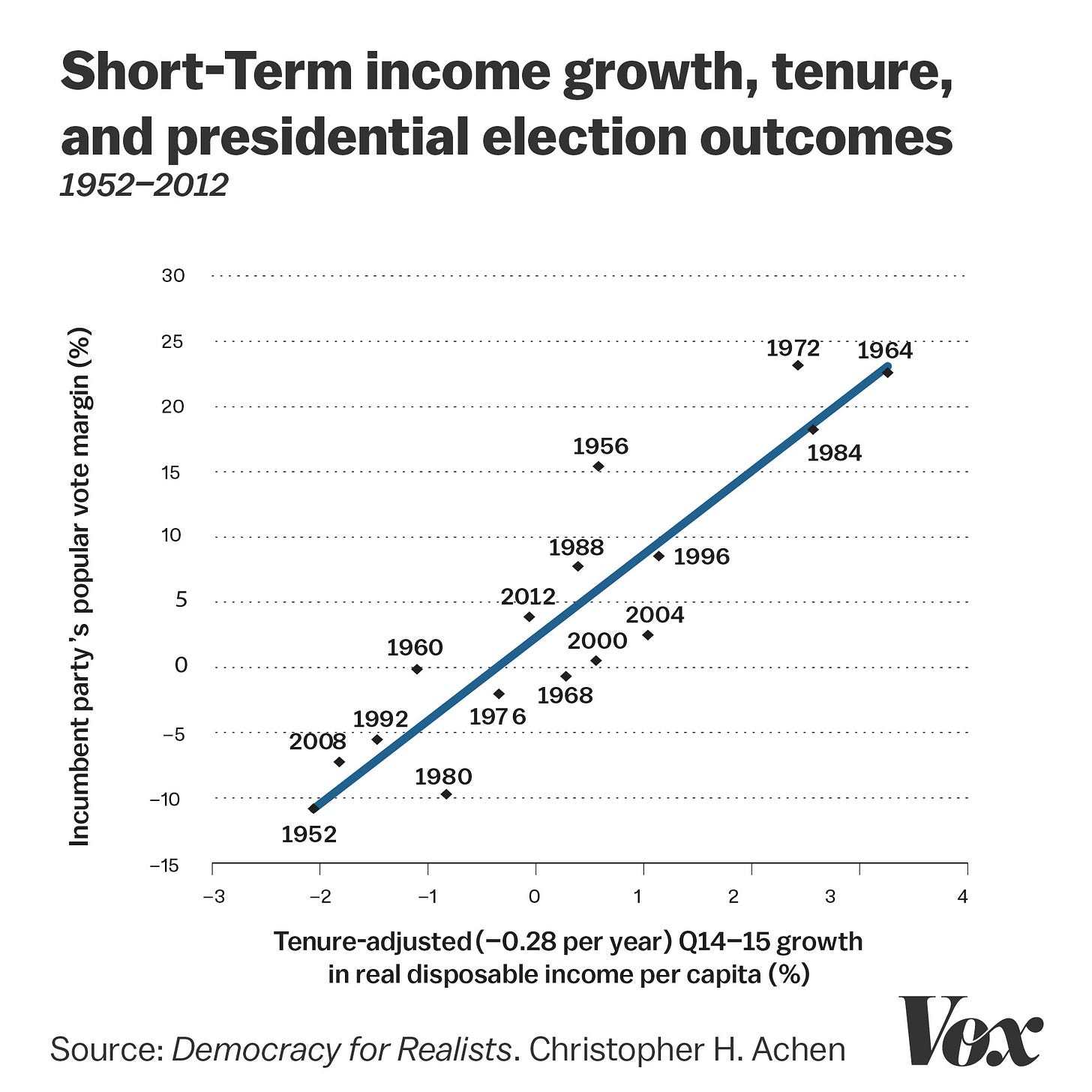The Trump Vibe Shift
Public opinion, especially on the economy, is turning against the president
This is a short post about how mass opinion toward Trump is decidedly not positive and changing fast. His weakness on economic issues in particular is worth viewing in the light of recent anti-incumbent sentiment around the globe. Could he suffer a similar fate to Biden or Trudeau?
As I wrote in my post last Friday, I hope to write more articles like this on my Substack as I figure out what's next post-ABC News/FiveThirtyEight. Please consider supporting my work with a pledge to subscribe to the blog in the future, if/when I turn on paid subscriptions. Pledges are also a useful benchmark in calculating the potential success of a larger, aggregation-focused collaborative news start-up that some of us are exploring.
There's been a persistent narrative over the past few months that American voters, and especially young people, have shifted rightward due to a desire for conservative policies, especially on spending, and general anti-Democratic sentiment. Polls showing a generational low for the Democratic Party brand have gained a lot of attention over the last few days, and many commentators are wondering whether young men in particular will ever vote for the left again.
This narrative is wrong. Mostly, I think it is all an overreaction to (a) slickly presented but cherry-picked and/or unrepresentative poll numbers and (b) a failure of the collective pundit class to acknowledge that trends are nuanced and causality is hard. There is a popular wrong impression that the average American is enthusiastically pro-Trump, rather than, to take an example from the 2024 elections, largely anti-Harris, or anti-inflation more generally. The data tells a different story.
I. The data
Take for example the public's support for entitlement spending. A poll conducted by AP-NORC in February found 62%-67% of adults thought the U.S. government should be spending more on entitlements, education, and assistance to the poor. And the General Social Survey finds that support for the federal spending on health care, child care, Social Security, and, well, pretty much everything, to be at or near all-time highs.
Then there's President Trump's job approval rating. In my average (a successor methodology to the one published at 538) of recent polls, Trump's approval rating stands at just 48.0% today, with a disapproval of 48.7%. That is hardly a number to cheer about, and would not be enough to rescue the party from next year’s likely midterm losses.
This all sets the background for discussing two new polls released this week. They help fill in the picture of public opinion toward Trump, the president — distinct from Trump, the man or Trump, the 2024 candidate.
First, a YouGov poll shows Americans believe Trump primarily looks out for the wealthy and big corporations rather than everyday Americans. According to YouGov's data, 87% of Americans say Trump "cares [a lot/some] about the needs and problems" of wealthy Americans, the highest of any group they tested. 77% say he cares a lot or some about white Americans; 73% say he cares about men and 72% about Republicans.
This is all in obvious tension with the image of Trump, the everyman, the steward of the multiracial working-class GOP, Trump the Populist. But it is of course in strict keeping with who he has (literally and figuratively) surrounded himself. He has handed over much of his reform agenda to the richest man in the world, and his Cabinet has the highest net worth of any before it. Trump's policies, too, stand to benefit the wealthy more than the average American.
This perception gap could be particularly problematic given Trump's success with working-class voters in 2024. If these voters come to believe Trump isn't actually fighting for them, his support could erode quickly. And the current economic situation is doing him no favors.
The second poll to catch my eye this week really rings this alarm bell. Echelon Insights' March Omnibus reveals rising salience of, and significant skepticism about his efforts on, the economy. 49% of voters say the country is off on the "wrong track," and 41% say the economy or cost of living are their most important issue. Most people say the economy is getting worse rather than better, and voters disapprove of how the president is handling the situation by a net 2 points.
And the Echelon poll is not an outlier. Last week CNN/SSRS found Trump underwater on the economy by a substantial margin: 44% approve versus 56% disapprove. That's his highest economic disapproval rating ever in CNN's polling. His high previously was in Dec. 2017, when 49% disapproved of "the way [he] is handling the economy.
Okay but Elliott, you might say, this is just one question, and the slight deficit seems unimportant. But remember, the economy/inflation is the issue that won Trump the White House in 2024. AP VoteCast data confirms that inflation was the most influential issue in the campaign, and one Trump had a strong edge on. But Trump didn't win because voters particularly loved him or his economic ideas (both candidates were unpopular going in to Election Day 2024). Trump won because he wasn't the incumbent.
And as the Financial Times' "Graveyard of Incumbents" analysis shows, incumbent parties all over the world suffered losses, plausibly due to mass economic pressures during the recovery from COVID-19.
II. The consequences
So what happens when the economy is still not good, housing is still not cheap and prices are still rising, but this time Trump is in charge? You're witnessing it. The pattern of economic dissatisfaction leading to incumbent defeats is one of the oldest and most durable findings in academic political science. It is practically a historical constant in American electoral politics. It's not unique to Trump or Biden.
The shift against Trump on the economy is important because (a) it's a big move in public opinion and (b) it's a ✨ vibe shift ✨, a change in how both people, but importantly the media, understand opinion about him that pre-conditions future electoral backlash. Previously, Trump was the inevitable president with a mandate to change the country. Now, he is the embattled incumbent with lagging approval ratings who people do not think is handling economic distress well, and who they do not see as looking out for people like them.
Now, Trump faces similar challenges to the ones that sank his predecessor.
Setting aside everything else going on in the administration, accountability on economics and public opinion could follow the normal patterns in U.S. politics. This Trump Vibe Shift in public perceptions of the president is particularly notable coming so early in his presidency. With a net-negative approval rating not two months into the job, Trump is the most unpopular president other than himself in 2017 to hold the office. The lowest-ever economic approval number suggests the same forces that helped propel Trump to victory could now work against him, especially if inflation resurges. The historical pattern documented in the FT analysis could come back to haunt Trump's party in future elections if these perceptions persist.
What the data reveals is a the continuance of an iron truth about American politics: Voters might reject one party's handling of the economy, but they don't automatically transfer their trust to the opposition. They maintain healthy skepticism of both parties' economic competence. Trump's political future may depend less on his opponents' weaknesses and more on his ability to actually deliver on the economic promises that got him elected. Understanding the reasons for Trump's victory is key to understanding why he is vulnerable in the future.









Very good piece. Just FYI, your section headers are both numbered "1" (or "I").
During Trump's first term the economy was buoyed by indulgent Federal Reserve policy in the form of quantitative easing and very low interest rates. That couldn't last, and Joe Biden necessarily faced headwinds from the Fed. The Fed is on a sensible course now that will neither impede nor aid Trump, although he will probably blame it for any economic troubles we confront.